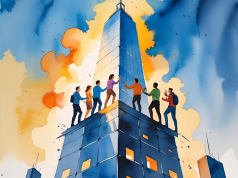In the early months of President Donald Trump’s return to the White House, immigration policy has once again taken center stage — and not in a way that signals progress or inclusion. Recent actions signal a hard turn inward, with a renewed emphasis on reducing reliance on foreign workers and tightening access to employment-based visas. While intended to protect American workers, these changes are stirring anxiety across industries already battling talent shortages.
At the heart of this shift is a renewed push for “America First” ideology, which centers on the belief that limiting immigration helps safeguard U.S. jobs and wages. The strategy focuses heavily on overhauling employment visa systems, particularly those that bring in skilled foreign professionals. But the reality on the ground tells a different story — one in which entire sectors could be destabilized by a shrinking pool of talent.
Tech at Risk: Cutting Innovation Off at the Knees
The tech sector is arguably the most visible victim of these changes. American innovation has long leaned on talent from across the globe, especially through the H-1B visa program, which allows skilled workers to fill roles in science, engineering, IT, and more. Limiting access to this talent pipeline not only puts projects at risk, but also deters global talent from viewing the U.S. as a viable destination.
By making the visa process more restrictive, the administration may believe it is curbing abuse or protecting wages. But the unintended consequence is a chilling effect on startups and tech giants alike, as they struggle to attract the best and brightest. Countries like Canada and Germany, which are actively recruiting international tech workers, stand to benefit from this U.S. retreat.
Healthcare and Agriculture: Quiet Crises in Essential Sectors
The tech world might make headlines, but essential sectors like healthcare and agriculture could face even more critical challenges. With an aging population and growing demand for in-home and long-term care, the healthcare industry has been increasingly dependent on immigrant caregivers. Tightening restrictions on worker visas — and ramping up deportations — could leave many vulnerable citizens without the support they need.
In farming and food production, seasonal labor programs are already under pressure. The recent policy changes are adding layers of bureaucracy and fear to a system that was already struggling to meet demand. Many farm owners fear that crops will go unharvested due to labor shortages, impacting food prices and availability nationwide.
Policy Through Punishment: A Shift Toward Penalty-Based Immigration
A notable trend in the administration’s new approach is a move toward revoking visas for minor infractions or past legal issues, such as a single DUI offense. This shift transforms immigration policy into a punitive system rather than a pathway to opportunity. Highly skilled individuals — students, researchers, caregivers — are now at risk of losing their legal status for reasons unrelated to their work or value to society.
The message this sends is clear: even small mistakes, or prior missteps, can outweigh your contribution to American communities and institutions. For universities, research labs, and innovation hubs, this is a serious blow. Collaboration, trust, and long-term investment in global partnerships are being eroded.
A Divided Base: When Business and Ideology Collide
Even among supporters of the Trump administration, there is a growing divide. Business leaders and entrepreneurs who helped fuel Trump’s return to office are now voicing concern. Some argue that the policies undermine U.S. economic competitiveness and innovation. Others insist that the nation must prioritize Americans first, regardless of the short-term pain to businesses.
This debate reflects a deeper tension between ideological purity and practical governance. While protecting domestic labor is a noble goal, the methods must match the reality of an interconnected global economy. Blanket restrictions, without targeted reform or consideration for sector-specific needs, risk doing more harm than good.
Balancing Protectionism with Progress
The core argument behind these reforms is the protection of American workers. But a system that pushes out talent, restricts growth, and discourages foreign investment doesn’t protect — it isolates. What’s needed is not a wholesale ban on foreign workers, but a smarter, more responsive immigration policy that considers the needs of the economy while addressing legitimate concerns like labor abuse and wage suppression.
Instead of walling off the workforce, policymakers should be modernizing visa programs, cracking down on actual abuses, and investing in training for American workers to complement — not compete with — global talent.
What’s at Stake
If the U.S. continues down this path, it risks turning away the very people who have driven so much of its progress. From Silicon Valley engineers to rural farmhands, immigrant workers are part of the country’s lifeblood. Reducing their numbers without clear replacements in place is a recipe for stagnation, not strength.
Immigration reform is necessary — but it must be guided by both data and compassion, not fear and ideology. The workforce of the future is global. And unless America finds a way to welcome that future, it will be left behind by it.




























